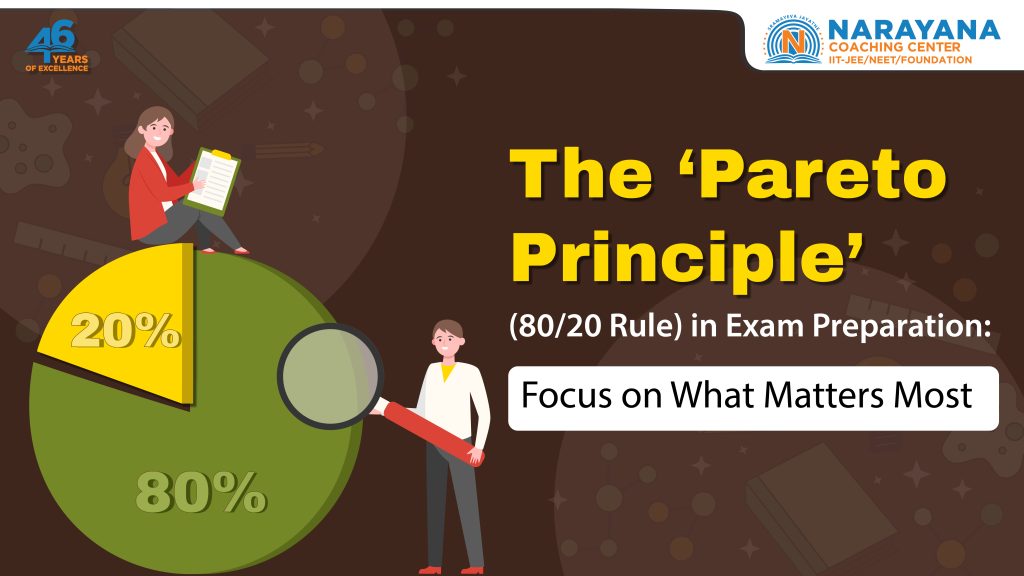
Are you feeling overwhelmed by the mountain of chapters, formulas, and practice papers for JEE or NEET? You’re not alone. But what if you didn’t have to study everything equally? What if success came from focusing on just a few high-impact areas?
Enter the Pareto Principle, also known as the 80/20 Rule — a proven strategy that can transform the way you prepare for competitive exams.
What is the Pareto Principle?
The Pareto Principle states that 80% of results come from 20% of efforts. Originally observed in economics, where 20% of people owned 80% of the wealth, this principle applies to nearly every area of life, including exam preparation.
For JEE or NEET aspirants, this means:
- 80% of your score may come from just 20% of the syllabus or problem types.
- 80% of your doubts might stem from 20% of the topics.
- 80% of your time might be spent on less important tasks.
Your goal is to identify and focus on the vital 20% that drives your performance.
How Does the 80/20 Rule Apply to JEE and NEET Preparation?
1. Prioritise High-Yield Topics
In both JEE and NEET, certain topics are repeatedly tested year after year. These are your gold mines.
For JEE (Mains & Advanced):
- Physics: Mechanics, Current Electricity, Modern Physics
- Chemistry: Organic Reactions, Chemical Bonding, Thermodynamics
- Maths: Calculus, Coordinate Geometry, Algebra
For NEET:
- Biology: Human Physiology, Genetics, Plant Physiology
- Chemistry: Biomolecules, Chemical Bonding, Organic Chemistry
- Physics: Laws of Motion, Optics, Modern Physics
📌 Action Tip: Analyse the past 5–10 years of exam papers to identify recurring topics. Prioritise these and spend more time mastering them first.
2. Master Core Concepts Instead of Memorising Everything
Deeply understanding a small set of core concepts can help you solve a larger number of problems. Instead of cramming every detail, focus on:
- Concept clarity
- Problem-solving strategies
- Inter-topic connections
For example, understanding the First Law of Thermodynamics can help you tackle multiple problems across both Physics and Chemistry.
3. Practice the Right Type of Questions
Not all questions are created equal. Focus on:
- Frequently asked MCQs
- Conceptual numericals
- Application-based problems
Spending time solving 100 random questions is less effective than solving 30 strategically chosen ones.
📌 Action Tip: Use smart books, mock tests, and coaching institute analytics to find high-frequency and high-weightage questions.
4. Use the 80/20 Rule in Time Management
Start with a quick audit of your study habits:
- How much time are you spending on actual learning versus passive reading?
- How often are you revising compared to endlessly chasing new material?
Apply the 80/20 rule like this:
- Spend 80% of your study time on the top 20% of high-impact topics.
- Dedicate 80% of your revision time to the 20% of concepts you find most challenging.
5. Smart Revision: Less is More
The truth is — you won’t remember everything. So why not focus on reviewing what matters most?
💡 Make a revision notebook with:
- Formulae that you often forget
- Diagrams you struggle to recall
- Trick questions you answered incorrectly
This becomes your personalised high-yield material — your 20% content that delivers 80% accuracy in exams.
6. Mock Tests: Quality Over Quantity
It’s tempting to keep solving mock tests endlessly. But if you don’t analyse them, you’re missing the point.
Apply the Pareto Principle:
- 80% of your mistakes likely come from 20% of your weak spots.
- Identify and fix those weak spots first, and your scores will naturally improve.
📌 Action Tip: After each mock test, spend more time reviewing than jumping into another one. Focus on why you made each mistake.
How to Identify Your 20%: A Quick Framework
- Check Previous Year Trends: Use NCERT and analyse past paper patterns.
- Evaluate Your Strengths and Weaknesses: Ask yourself: ‘’Where do I lose the most marks?’’
- Ask Your Teachers/Mentors: They know which areas to focus on more deeply.
- Use Analytics: Apps like Embibe, Unacademy, or your coaching institute’s platforms can help you identify high-weightage areas.
Final Thoughts: Study Smart, Not Just Hard
Competitive exams like JEE and NEET are not just about hard work — they are about strategic work. The Pareto Principle teaches you to use your time and energy on what truly moves the needle.
👉 Focus on the top 20% of topics, questions, and concepts.
👉 Review the top 20% of your mistakes.
👉 Use your top 20% of study time wisely.
Remember, it’s not about studying more, but about studying right.
Bonus: A Simple 80/20 Study Plan Template
| Time Slot | Activity | 80/20 Focus |
| 6 a.m.–7 a.m. | Revise core formulas/concepts | Top 20% notes |
| 7 p.m.–9 p.m. | Solve 20 practice questions | Top 20% chapters |
| Sunday | Mock test review | Top 20% mistakes |
Ready to level up your prep?
Start applying the Pareto Principle today and watch your results improve without burning out.
